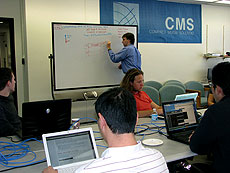CMS researchers go back to school at J-Term workshop
 |
| Jeff Temple, U. Maryland, taught J-Term attendees how to spot noise in the CMS hadron calorimeter. |
When Angela Marotta, a first-year graduate student at Texas A&M, learned she could spend a large portion of her winter break in the LHC Physics Center at Fermilab, she jumped at the opportunity.
"We have a lot of tutorials online, but it is so helpful to have someone explain it to you in person," Marotta said.
She and more than 100 other students, post-docs and professors signed up to take a crash course on the CMS experiment at the "EJTERM" (Extended January-term) workshop "Commissioning and Analysis of Early Data with CMS" on Jan. 5-9. From an overview of how the detector works to how to spot noise verses real particles in an analysis, attendees could sign up for more than a dozen different classes, making this year's workshop resemble a university campus.
"When you join a big collaboration like CMS, you need a university to go along with it," said Sudhir Malik, a physicist at the University of Nebraska and convener of the CMS Users Support Group.
This was the fifth time the workshop had been held, but in response to feedback, this time the organizers made 90 percent of the workshop hands-on tutorials (previously it had been 10 percent) and there were extensive pre-workshop online exercises as well so that students arrived well-prepared. For the very first time, attendees also had the opportunity to use real LHC data that was collected just before the holidays.
"We have been doing simulations for 10 years, and real data changes everything," Malik said.
Each attendee completed a mini-analysis and presented their results at the end of the workshop. Even though a physics analysis should take one to two years, Malik said, the mini-analyses help them prepare for the real thing.
Marotta, for example, focused on muon reconstruction and learned how to spot a real muon from a fake one. "I really liked measuring cross-sections," she said.
But for her, the best part about EJTERM was talking to other people and figuring out who to contact for help.
All of the tutorials and mini-analyses are now available on the Web, and so many more new to CMS around the world can benefit from them.
"The support structure in the LPC is very good," Malik said. "If you're doing analysis, this is the place to be."
--Elizabeth Clements
|